- Home
- Neil Gaiman
Beowulf Page 2
Beowulf Read online
Page 2
THE END
As you can see from my treatment, my problem was Beowulf’s odd two-act structure. It had always been the element that made it a difficult film adaptation. Beowulf is divided into major acts. The first half in Denmark, fighting Grendel and his demon mother. The second act taking place in Geatland, decades later, Beowulf now a king himself who must die killing a dragon to save the land. The two halves of the epic deal with the differences between the ambitions of youth and old age, and how it is a very different thing to rule a kingdom than it is to win one. The seemingly fractured structure of Beowulf is important to his arc, but in movie terms this bifurcated storyline was more of a detriment than an equity.
One day, while struggling with the second half of Beowulf, trying to make it work with the first half, Neil Gaiman called me. Neil had come to respect me, I believe, for leaving Sandman rather than bastardize it. He asked me what I was up to and I told him about my theories on Beowulf, not to mention my second act problem. And then, with that elegant English accent of his, he stated the obvious: “Roger, don’t you see? If Grendel is Hrothgar’s son, the dragon surely must be Beowulf’s son—come back to haunt him.”
Had it been a snake, it would have bitten me. Neil had just conceived the Beowulf Unified Field Theory, solving a problem that has plagued frustrated filmmakers for decades as if it were simple grade-school addition. I asked Neil if he wanted to collaborate with me on the screenplay, inviting him into the process. It would be a boon. His depth of knowledge of mythology and tradition would lend itself nicely to the project. His measured and sensitive dialogue would serve as a fine contrast to my more berzerk tendencies. To my delight, and my great benefit, Neil agreed.
Our deal was that Neil would receive first position, and that I, as director, would control the destiny of the material. The sale, the production, etc. I would also provide a neutral location for us to conduct the writing. Neil lived in the Midwest, and I lived in Manhattan Beach, California. For some reason, though it made no sense considering the subject matter, I chose Puerto Vallarta.
I secured a quinta with a full-time cook and bartender. It was a massive, fortress-like compound, surrounding a large pool that overlooked the Pacific Ocean. Next to the pool was a palapa, inside of which was a pool table. Neil and I would play some pool, then go in the pool, and then have a margarita—and then we would write—and then we would play some more pool, and then, of course, go back into the pool.
We wrote on two early Powerbook 120 computers, using a 3.5” floppy disk to transfer scenes back and forth. We divided the movie up between us, and then began furiously hammering out scenes. When a scene was complete, we would transfer it to the other computer, and it would be rewritten by the other writer. It went shockingly smooth, and in just under two weeks we had a first draft finished. We were also sunburned and fatter from eating burritos and drinking Mexican beer nonstop.
We returned to Manhattan Beach, looking like we were coming home from Club Med, and sent the script to our agents at the most powerful talent agency in the world, CAA.
It was around then that I discovered that in Hollywood, at that time, Beowulf was considered something of a joke. A sword-and-sandal hoity-toity lesson in ancient literature. People had entertained making it for years, only to be met with laughter. The truth, I imagine, is that most executives and producers would sit down to read the text and glaze over after the first paragraph. No one wants to be reminded of high school English, and this was a major strike against getting the material to be taken seriously as a Hollywood movie. My agents received the script, reminding me of this legacy, and then it sat. I assumed that they did nothing to promote the material, but I was wrong. The elves at CAA were quietly and feverishly reading it and passing it from stack to stack, and eventually it found its way into the right stack.
A few months had gone by when I received the call from ex-über-agent and former young Turk, Jack Rapke. I had always considered Jack one of the smartest agents I had ever met—and possibly one of the scariest (the smart ones are always the most terrifying). He has a slow and measured voice that articulates words so that they rise, dip, and then rise again. It’s a mesmerizing pattern of speaking, and it causes you to hang on every word as if its formed from a complete story arc, with a beginning, middle, and end. I’ve never met a man with more experience eating at restaurants around the world. You can tell Jack that you’ll be going to any city on the planet (say, Catolica, Italy), and he’ll proceed to tell you the best restaurant to dine at, how to get there, and the name of the owner. For example, Catolica, Italy: “Roger, there’s a little bistro off the main Rambla, on a crooked street that leads toward the basilica, just across from the butcher, but there’s no sign out in front. Look for the red door. If you go there between nine P.M. and eleven P.M., on Thursday through Saturday, let yourself in and ask for Martina. Be sure to have the gnocchi—it’s unparalleled.” If you ever meet Jack Rapke, pick a random city and ask him where to eat. He won’t disappoint you.
Jack had just left CAA and was forming a new company with director Robert Zemeckis. Jack had read the screenplay, thought it was amazing, and had passed it to Robert, who insisted that this was exactly the kind of film that their new company, ImageMovers, should be making. They wanted to option the script.
I met with Jack and Robert in their lavishly decorated Amblin offices. After a lengthy and passionate pitch trying to convince me to option them the screenplay so that they could make it as a big-budget studio epic, I explained to them that I had only written it so that I could direct it myself. They told me that no one else would be better to pull it off. I think at the time they actually believed that.
I had always seen the film as a smaller-budget epic, dirty and raw—but the promise of having the tools to make the film reach a larger audience was a dream come true. It was all happening faster than I could have hoped. Attorneys drew up contracts and money changed hands. I was now in the ImageMovers fold, and through their output deal with DreamWorks I would be making my first studio film as a director.
But Spielberg had a hair up his ass regarding the project. Maybe he didn’t like the script, maybe he didn’t like my work as a director, or maybe he thought it was too violent. Regard less, after a year of working on rewrites, Jack and Robert resigned themselves to the unpleasant prospect of having to set the movie up outside of their first look with DreamWorks. One thing I will say about Jack Rapke and Robert Zemeckis (or Z., as I would come to know him) is that they never stopped believing in me as the director of the film, and they stood by me through thick and thin. But soon, the option had expired.
I continued to work with Jack and Robert for another year, but it had been years since my first film, and interest in me in the marketplace had waned. Soon, through no fault of my ImageMovers partners, the project began to wither a slow death on the vine. I moved on, yet again, hoping to one day return to Beowulf.
Time passed and occasionally I would speak to Jack, and he would ask if I would consider allowing anyone else direct the film. “Only Terry Gilliam,” I would dictate, not knowing that he had been Jack’s client at one time and that Jack wasn’t too keen on revisiting the manic energy of that relationship. What I didn’t tell him, was that I would have let Robert Zemeckis direct the film. Besides, Zemeckis’s slate was full for years to come. He was splitting the production of Cast Away and was squeezing in What Lies Beneath while Tom Hanks dropped fifty pounds. I’ve always loved Zemeckis’s work—especially Used Cars. On our first story meeting, at a country club in Montecito, I brought my laser disc of Used Cars for him to sign. He’s a great American auteur, and a man who constantly pushes the boundaries of what’s visually possible to better tell his stories. The thought of him directing Beowulf was enough a transformation—enough of a radical departure—of what I was envisioning that it recalled my seeing Tony Scott’s True Romance for the first time after working with Quentin Tarantino for years on his vision for the same script. But I still believed I’d one day dir
ect the script myself—maybe I would find myself in a position to make it again.
Jack always remained polite, and supportive of me, but as we were unable to pull the financing together, our relationship waned, and we gradually drifted apart.
Eventually, I directed a low-budget adaptation of Bret Easton Ellis’s novel The Rules of Attraction, and while doing press in Paris for the film I had dinner with producer Samuel Hadida, who had financed my first film. I love Sammy, he’s always been there for me when the chips are down. His motto is “We like, we make,” and when he gets it into his head that he’s going to make a movie, he’s relentless and passionate. His Paris-based production and distribution company had grown to the point that he was now considered one of the big players in Hollywood: the Weinstein brothers rolled into an energetic French-Moroccan with a passionate love of movies.
“I have been thinking about your Bee-Wolf,” he told me in his highly accented English, “and I am in the zone of making epics. Why not we make this film?” It was unexpected, but welcomed. There was only one problem, and it was called…TURNAROUND.
In Hollywood, when you incur development expenses on a project and the project doesn’t get made, the costs of development become attached to the project. DreamWorks had taken the option payments and added giant line items called simply “Development Expenses” to the turnaround on Beowulf, and they added up to a staggering figure. I realized that the flowers and oak and antiques in the ImageMovers/Amblin office all came at a price. Beware well-appointed production companies with comfortable chairs; they’ll somehow find a way to write it all off onto dead productions. The only solution was to disregard all of the drafts that had been generated during development and go back to draft one, which Neil and I had written in two weeks while sunning in Puerto Vallarta. This was not a problem for Neil or I, for we loved that first draft. It was raw and pure. Our vision undistilled by the Hollywood process.
This is that draft…
First Draft
BEOWULF
as told by
Neil Gaiman & Roger Avary
Draft Dated:
June 10, 1997
Registered: WGA/w
© Copyright 1997
Hwæt! We Gar-Dena
peod-cyniga,
hu oå æpelingas
in geår-dagum,
prym gefrunon,
ellen fremedon!
Listen! We have heard
In the old days,
How noble princes
of the Spear-Danes’ glory
the kings of tribes--
showed great courage!
“Beowulf”
Lines 1-3
Original Author Unknown
NORTHERN DENMARK
518 A.D.
THE AGE OF HEROES
FADE IN:
1 EXT. HEROT-DAY
1
EXTREME CLOSE UP ON: The face of KING HROTHGAR. He is a man past the prime of his years, but still a mighty warrior, and a charismatic leader of men. As he bombastically talks, with full volume, to a large audience, we SLOWLY PULL BACK.
HROTHGAR
A year ago I, Hrothgar, your King, swore that we would celebrate our victories in a new hall, a mighty hall and beautiful. Craftsmen from all over the land of the Danes, and from all the civilized world have worked on this hall to make it the finest mead-hall on the face of the earth.
PULL BACK TO REVEAL that Hrothgar is atop his horse in front of a huge mead hall, which is called Herot, and that around him are a HUGE BAND OF DANES--closest to him are WARRIORS, and ADVISORS, including ESHER, an elderly man, and UNFERTH (with long black hair streaming out from his winged helm and intense black eyes).
Further away are the MERCHANTS and the WOMEN and CHILDREN and DOGS. Everyone is Filthy. For that matter everyone in the film is filthy.
The queen, WEALTHOW (who is less filthy than everyone else), stands a little behind the King, with a COUPLE OF HER LADIES. Wealthow is over thirty years younger than Hrothgar, his second wife, and is radiantly beautiful. Her chief lady is YRSA, a girl with intense blue eyes and contrasting black hair to the queen’s blond locks.
The King is happy, shouting loudly enough to be heard by the furthest dog.
HROTHGAR (CONT’D)
(continuing)
In this hall I shall have my throne. In this hall we shall feast and tell of victories. In this hall shall the scops sing their sagas. And in this hall we shall divide the spoils of victory, the gold and treasure. This shall be a place of merrymaking and joy from now until the end of time.
Hrothgar holds out a huge bejewelled cup to a PAGE, who pours mead into it from a jug. Hrothgar holds up the cup.
HROTHGAR
I name this hall…
He takes a huge swig of Mead. His eyes are bright. Then he pours the rest of the mead on the doorway.
HROTHGAR
(continuing)
…Herot!
And the crowd CHEERS.
CUT TO:
2 INT. HEROT-MEAD HALL-NIGHT
2
Everything is golden and burnished. The CROWD are NOISY AND CHEERING and happy. We see golden mead being poured from jugs into goblets. One warrior sticks out his helmet, mead is poured into it and soon he is drinking from it. A brace of golden roasted geese are brought out on wooden serving platters. The fire is burning golden-orange in the fireplace. It’s noisy and riotous.
Hrothgar is sitting at a huge throne, and beside him is a pile of golden treasure --wristbands, rings, neck-rings, helmets and the like.
CUT TO:
3 EXT. HEROT - THE MOORS - NIGHT
3
We are a short distance away from Herot. All is blue-grey and still. Mists hang low on the moor. Smoke and MUFFLED JUBILATION come from the Hall. A door opens and a man stumbles out to piss.
CUT TO:
4 INT. HEROT - MEAD HALL - NIGHT
4
NOISE once more assaults our senses. Hrothgar is laughing loudly at some dirty joke. He picks up his queen, Wealthow, and kisses her long on the mouth, while she beats at his chest with her fists, demanding to be put down. His WARRIOR THANES cheer him on.
CUT TO:
5 EXT. THE MOORS - HEROT - NIGHT
5
The hall is now a tiny smudge of light in the distance. WE ARE MOVING AWAY FROM IT, and now are slightly above the ground. Mists writhe beneath us.
CUT TO:
6 INT. HEROT - MEAD HALL - NIGHT
6
They are dividing the treasure. Hrothgar is having a great time doing this. He’s drunk, but then, everyone’s drunk. With each distribution of treasure, with every joke, THE CROWD CHEERS.
HROTHGAR
And to Wulf the Eight-Fingered, who was valorous in battle but puked like a seasick babe whenever he got into a ship--
We see WULF glowering, as his friends nudge him in the ribs.
HROTHGAR
(continuing)
--this golden wristband, and this ring.
He tosses them into the crowd. Wulf catches them.
HROTHGAR
For Unferth, my wisest advisor, violator of virgins and boldest of brave brawlers--where the hell are you, Unferth, you weasel-faced bastard? Here you go--
Hrothgar puts a huge golden torque or a thick gold chain around Unferth’s neck. CHEERS. A man throws down a bone for a dog, onto the rushes of the floor.
CUT TO:
7 EXT. THE MOORS - NIGHT 7
The SOUNDS OF THE REVELRY are almost lost to us now. An owl HOOTS. We are travelling through the quiet blues and greys of the mist on the moor. OMINOUS BASS MUSIC starts, almost imperceptibly.
CUT TO:
8 INT. HEROT - MEAD HALL - MONTAGE - NIGHT
8
IN A SERIES OF SHOTS:
The revelry in the hall is reaching a fever pitch…
9 ERICK,
9
one of Hrothgar’s Thanes, is talking to the King, Esher, and some other warriors.
ERICK
> So I look up, wipe the blood from my eyes, and the bastard’s gone and pulled a knife from his boot, he has!
ESHER
And what was it you did?
ERICK
Right. Well. I turned, like this, and I stabbed out, like this, but at the same time, I did this thing, right…
He’s trying to show his THANE FRIENDS what he did…he lunges forward, using a leg of goose as a sword, loses his balance, falls back, knocking into the King, who goes down.
There is a moment of NERVOUS SILENCE in the hall -- what is the King going to do?
Hrothgar glares, for a moment, then begins to LAUGH UPROARIOUSLY, and the hall resumes partying.
10 WULF THE EIGHT-FINGERED
10
is in earnest conversation with a young lady, ISOLDE THE FAT. He’s holding out his golden arm-bracelet.
WULF
You want to feel it? Yeah, of course it’s real gold…
ISOLDE THE FAT
I don’t think so, dearie.
WULF
That stuff he was saying about me puking. That was just his little joke. I got a stomach like a rock.
11 A BAND OF WARRIORS
11
are together in one corner of the hall, singing an obscene and lusty warrior song, more or less together.
12 ROLF THE BRAVE IS CHASING GITTE THE SLUT
12
through the hall. They are both giggling, as they play something close to hide and seek.
13 SEVERAL ELDERLY LADIES

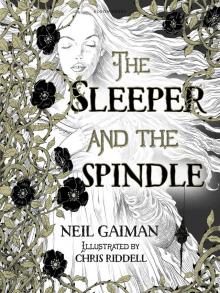 The Sleeper and the Spindle
The Sleeper and the Spindle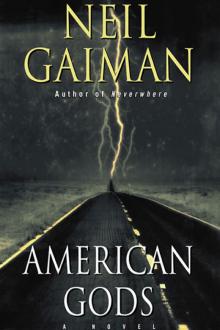 American Gods
American Gods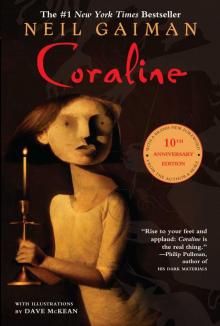 Coraline
Coraline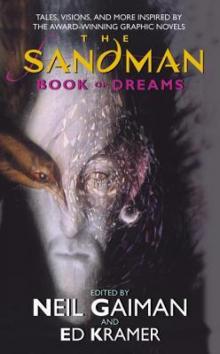 The Sandman: Book of Dreams
The Sandman: Book of Dreams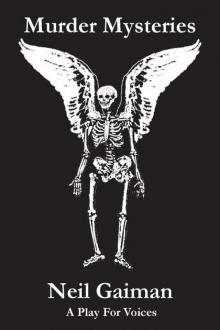 Murder Mysteries
Murder Mysteries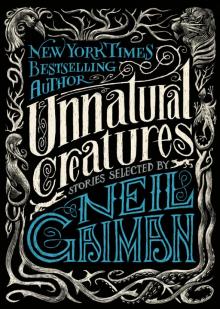 Unnatural Creatures
Unnatural Creatures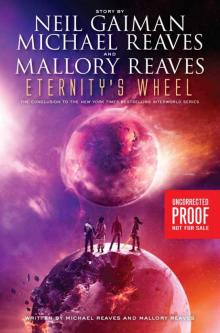 Eternity's Wheel
Eternity's Wheel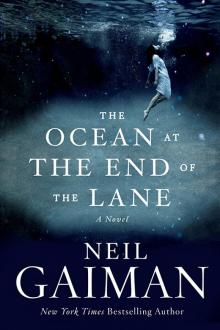 The Ocean at the End of the Lane
The Ocean at the End of the Lane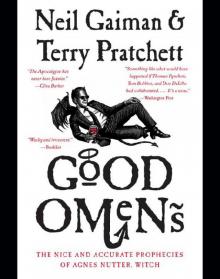 Good Omens
Good Omens Stardust
Stardust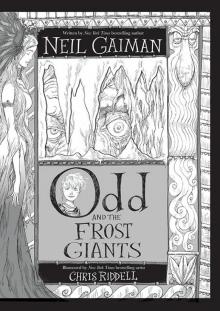 Odd and the Frost Giants
Odd and the Frost Giants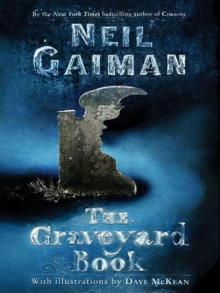 The Graveyard Book
The Graveyard Book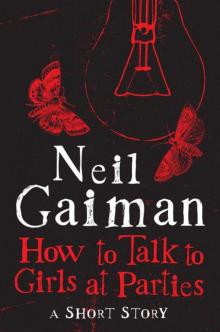 How to Talk to Girls at Parties
How to Talk to Girls at Parties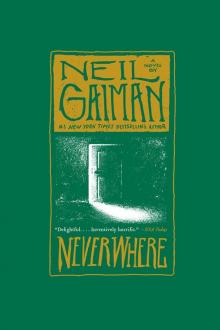 Neverwhere
Neverwhere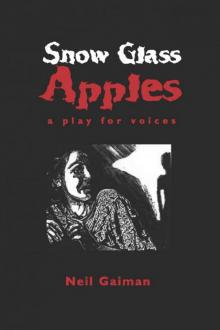 Snow, Glass, Apples
Snow, Glass, Apples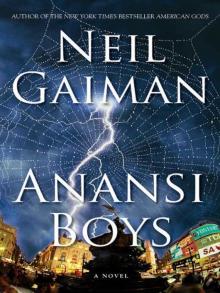 Anansi Boys
Anansi Boys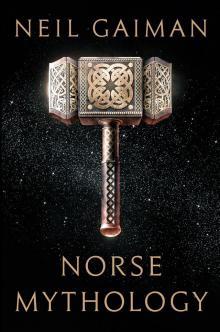 Norse Mythology
Norse Mythology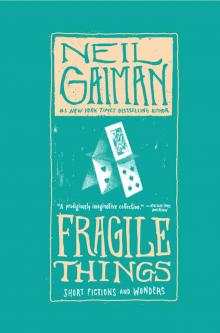 Fragile Things: Short Fictions and Wonders
Fragile Things: Short Fictions and Wonders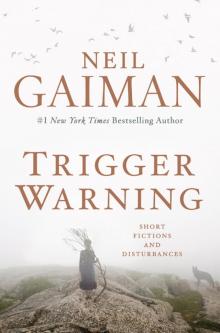 Trigger Warning: Short Fictions and Disturbances
Trigger Warning: Short Fictions and Disturbances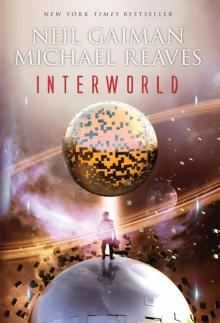 InterWorld
InterWorld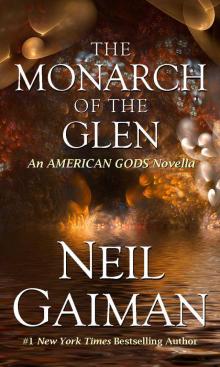 The Monarch of the Glen
The Monarch of the Glen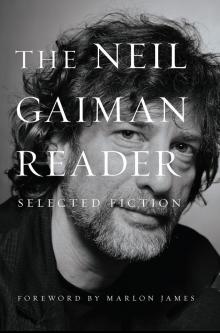 The Neil Gaiman Reader
The Neil Gaiman Reader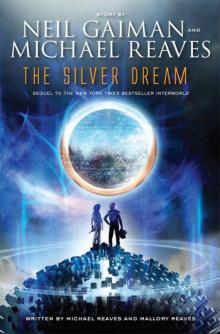 The Silver Dream
The Silver Dream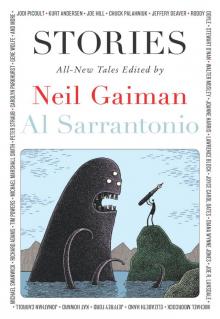 Stories
Stories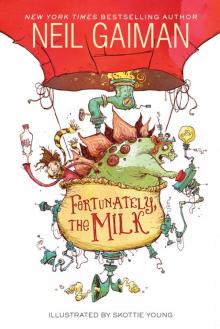 Fortunately, the Milk
Fortunately, the Milk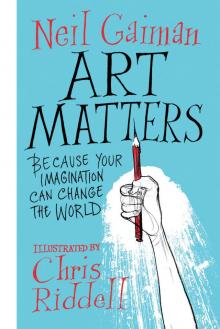 Art Matters
Art Matters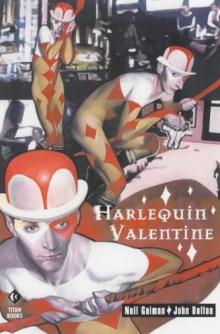 Harlequin Valentine
Harlequin Valentine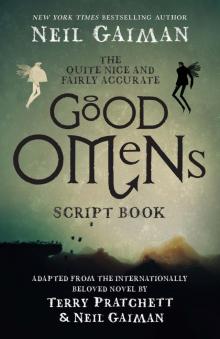 The Quite Nice and Fairly Accurate Good Omens Script Book
The Quite Nice and Fairly Accurate Good Omens Script Book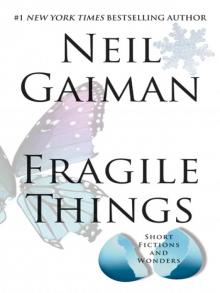 Fragile Things
Fragile Things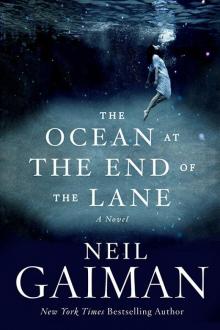 The Ocean at the End of the Lane: A Novel
The Ocean at the End of the Lane: A Novel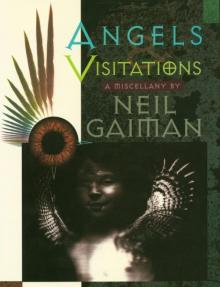 Angels and Visitations
Angels and Visitations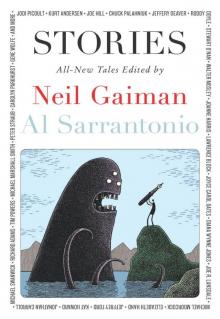 Stories: All-New Tales ngss-1
Stories: All-New Tales ngss-1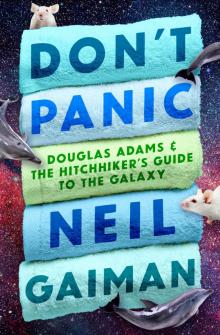 Don't Panic
Don't Panic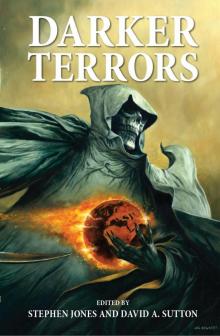 Darker Terrors
Darker Terrors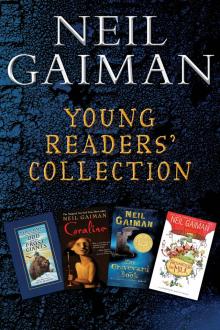 Neil Gaiman Young Readers' Collection
Neil Gaiman Young Readers' Collection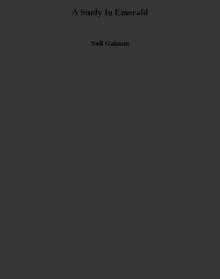 A Study In Emerald
A Study In Emerald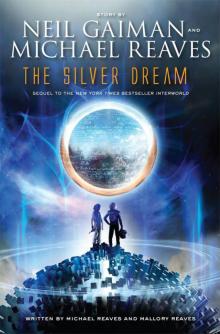 The Silver Dream: An InterWorld Novel
The Silver Dream: An InterWorld Novel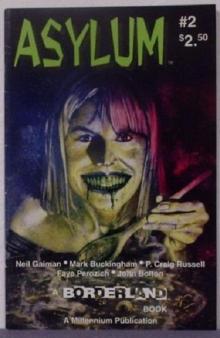 Feeders and Eaters
Feeders and Eaters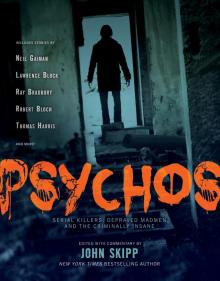 Psychos
Psychos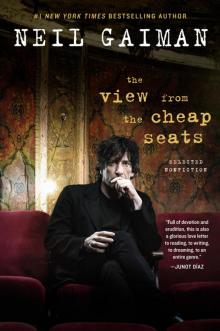 The View from the Cheap Seats
The View from the Cheap Seats Trigger Warning
Trigger Warning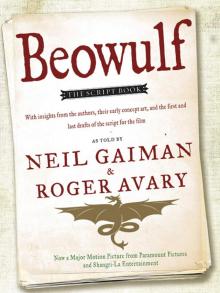 Beowulf
Beowulf Nessun Dove
Nessun Dove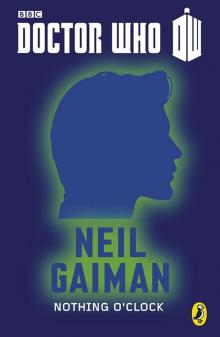 Doctor Who: Nothing O'Clock: Eleventh Doctor: 50th Anniversary
Doctor Who: Nothing O'Clock: Eleventh Doctor: 50th Anniversary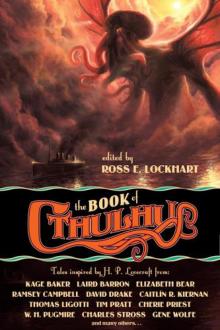 The Book of Cthulhu
The Book of Cthulhu